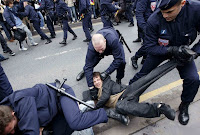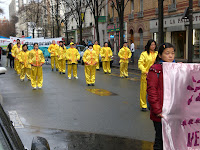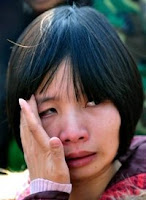
I did not watch the opening ceremonies of the 2008 Beijing Olympic Summer Games, but the journey of the flame from city to city had held my attention for several months beforehand. Mainly because of the kerfuffle it made coming through Paris in April. Waves of angry protesters came on the scene, some of them attempting to quench the fire in protest of Chinese human rights violations, while the French police distinguished themselves by beating the more feisty and vociferous members of the crowd. (Incidentally, the bloody images that I remember from French television are not to be found anywhere on Google.) Jin Jing, one of the carriers in Paris - admittedly a very brave woman to roll in her wheelchair through a crowd of French protesters -became a
national hero in her own country, hailed for protecting the flame against "sabotage" in a foreign country. And Sarkozy apologized.

By the time it reached China, the flame incited mainly positive responses from onlookers. In a spectacular show of human invention and endeavour, the final bearer of the torch was suspended by wires, like Peter Pan, and "ran" around the rim of the enormous stadium, finally lighting the flame, which zipped up to the cauldron, signaling the beginning of the Games of the XXIX Olympiad. (Thanks, Youtube.)
Five days before this stunning event, another torchbearer quietly left the world that had both hated him and loved him. On August 3, 2008, Aleksandr Solzhenitsyn passed away from heart failure in his home near Moscow. In a fit of curiosity, I researched whatever I could find online about this extraordinary man, and when I decided Wikipedia wasn't satisfying enough, rummaged around my parents' bookshelves for a copy of The Gulag Archipelago. It was so captivating that I couldn't tear myself away to watch anything on television, eventful or no. I was deep in communist Russia, learning the truth about...them. And myself.

This book is certainly a critique of ideas - particularly communism, an ideology which Solzhenitysn believed would inevitably culminate in a violent regime. Good laws and good systems are a necessary part of the human existence, and the choices we make with these are crucial. Dorothy Sayers reminded me just the other day of how "law" works in an imperfect world:
"The more closely the moral code agrees with natural law, the more it makes for freedom in human behavior; the more it departs from the natural law, the more it tends to enslave mankind and to produce the catastrophes called "judgments of God"." (The Mind of the Maker, 9).
But the author of The Gulag Archipelago has a much bigger point to make. His political expose is unique in that he claims that he himself could have been among the perpetrators of evil in his country, given a different twist of fate. That is, the system is evil, and so am I...and so are you. This is so very different from the typical American right-wing response (go find evil and root it out before it gets us), and the typical American left-wing response (there's no such thing as evil). The great Russian writer, a devout Christian, cuts across our party lines to remind us of truth and humility all at once:
"If only it were so simple! If only there were evil people somewhere insidiously committing evil deeds, and it were necessary only to separate them from the rest of us and destroy them. But the line dividing good and evil cuts through the heart of every human being. And who is willing to destroy a piece of his own heart?"

To live astutely in a fallen world, we must first know ourselves. Know thyself! This reminds me of the Apostle John's account of Jesus' life, when he says that Jesus was not "entrusting Himself" to man, for He knew all men, and because He did not need anyone to testify concerning man, for He Himself knew what was in man" (John 2:24-25). First, we look to ourselves. Only then can we begin to understand our world.
Back to China. As you have probably guessed, there is something about reading up on the horrors of a Communist regime that puts a slight distaste in my mouth for watching the Beijing Olympics. I have caught a race here and there, and not without enjoyment. But I cannot help but imagine that behind all commercialized glitz and glamor lies a cruel and cold system of control that has, in Sayers' words, "departed from the natural law." Go world? Really? We are way too self-congratulatory.
Laojiao. "Reform though labour". These are Chinese camps that crowd in petty criminals

(prostitutes, drug dealers, political dissidents, members of house churches, and practitioners of sects -the usual dangerous types) for up to four years. Four years may not sound like much, but this is how it all starts. (For example, Solzhenitsyn recounts how over the course of his imprisonment how the typical sentences went from 8 years, to "tenners", to twenty, to twenty-five. Essentially, a death sentence for most, given camp conditions and rigors. ) I am reminded of the sober faces of Falun Gong believers marching bravely and carefully up our street in Paris a year and a half ago with signs reading "Truth, Goodness, Tolerance" and handing out fliers outlining the categorical suppression of their faith in their homeland. In France, they are allowed to speak in freedom. But what about the days of eerie silence following the recent crackdown on the largely peaceful protest of Tibetan monks?

Where they are now?
"Are you from freedom?"
This quivering question was apparently a common enough greeting to a newcomer in the Laojiao - er, I mean -
Gulag of Communist Russia. The pitiful figure would stumble into his squalid cell, starving, sleep-deprived, and dazed from torture - and land amongst fellow prisoners, anxious for his story and news from the outside world.
Let's be honest. Not much has changed since 70 or 80 years ago- neither in the heart of man, nor in the systems to which the pride of man succumbs. We who are still "from freedom" have our own torch to bear. Know yourself, and tell the truth about your times.
P.S. Please see the The Plank (a blog at the New Republic) for their "
Chinese Dissident of the Day" feature. If you are a follower of Jesus Christ, please pray for these prisoners.











